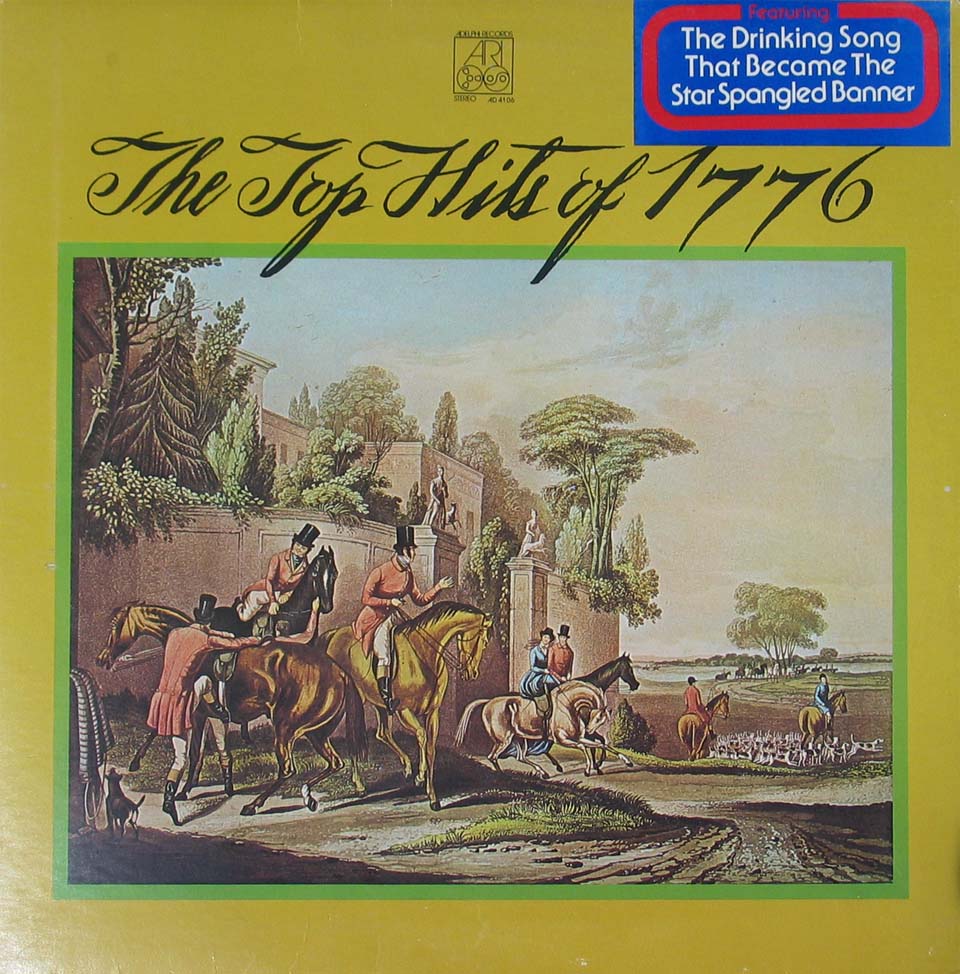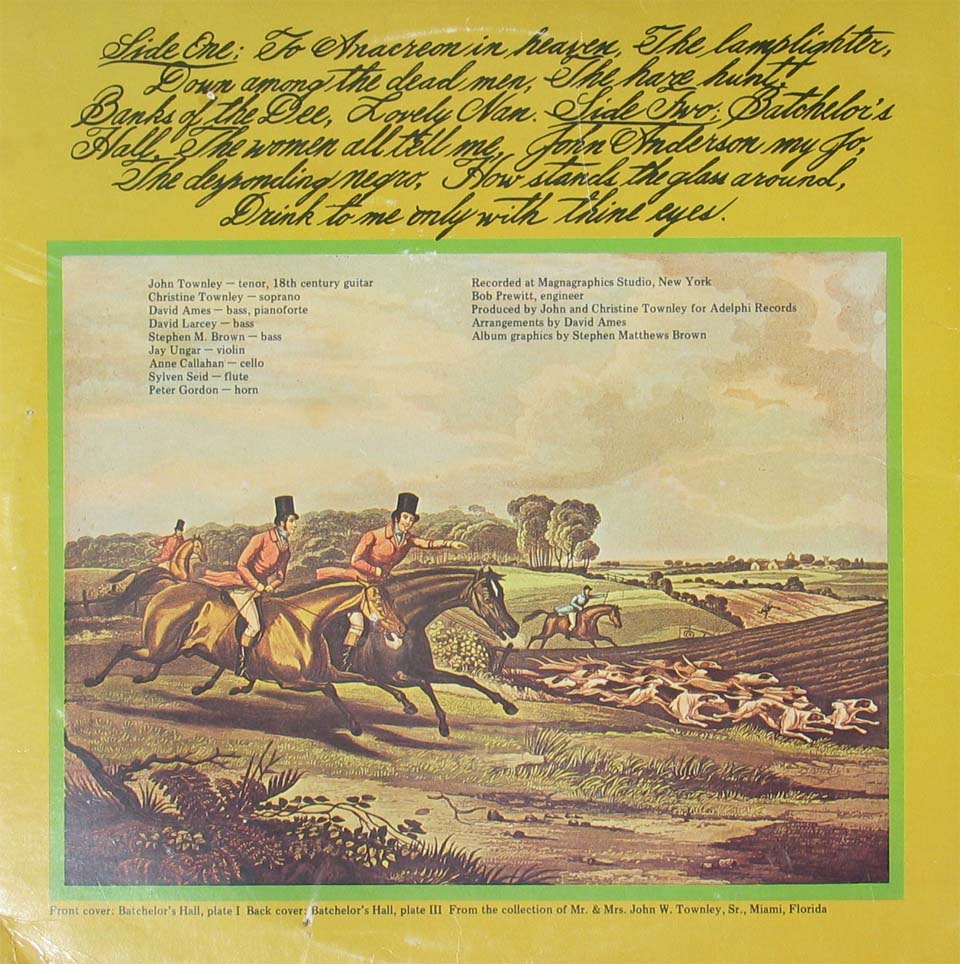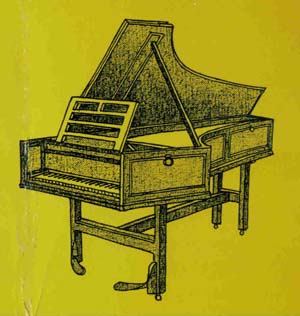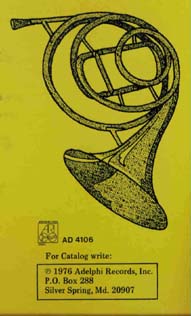
It’s
been long enough since this original
history-documenting LP has been available – missing reprint
in
either cassette
or later CD formats – that it needs a brief twenty-first
century
historical
note itself. In the early 1970s, I was asked to sing and play on a
variety of
American history recordings in the run-up to the Bicentennial,
including album sets
for The National Geographic Society and Oscar Brand, who published a
book and several albums of
American Revolution period songs. Throughout, I found it peculiar that
almost all the material was political, as if singing about the war was
the only music on American lips at the time, which was very much not
the case.
So, after a year or so of poring over period music collections,
songbooks,
sailor’s companions, broadsheets, and contemporary musical
biographies at the
New York Public Library, Julliard, and elsewhere, I came up with a
collection
of what were actually the most commonly found songs in the historical
record of
the late Colonial and early post-Revolution periods. From these I
subtracted
the political songs (already recorded) and with the generous help and
support
of Gene Rosenthal at Adelphi Records,
went into the studio and recorded the
cream of the crop. They were the songs of love, drinking, hunting,
humor,
entertainment and even wry cultural commentary that
The reasons this effort has fallen into obscurity, without reprint, are both technical and economic. When the final mix was taken for disc mastering, it turned out the construction and electronics of the 8-track studio we used had conspired to hide serious distortion above about 12,000 Hz (it was a rock ‘n’ roll studio, nobody had noticed before), so we had to roll off everything above that level, turning it into a seriously lo-fi product – well, Martha Washington might have mastered it with one of her knitting needles, so perhaps there’s something vaguely historical there. Second, when release time for the spate of Bicentennial records came along in the spring of 1976, the press raised a terrific hue and cry about the “commercializing” of the event (in contrast to the mercantile bonanza of the 1876 Centennial), and the result was almost nobody made any money doing so. Even the most lavishly-funded and promoted productions lost money – indeed, this album was not even reviewed by a major newspaper, until it became the front-page pick of the New York Times art section exactly an entire year later.
So here it is, well-served by the .mp3 format so many years later. It contains many songs never before recorded, to this day. Indeed, Charles Dibdin’s jewel “The Hare Hunt” is no longer even available in his English sheet music collections and was fortunately saved by its reproduction in a contemporary American songster. The most obvious hit became “The Star Spangled Banner” for which we have also devoted an extra page here. Now to the original introduction, from the last century…
--
John Townley,
Sea

But what of earlier and simpler days before the rattle of Tin Pan Alley evolved into quadraphonic stereo? What songs rekindled memories of the birth struggles of a young nation for an aging George Washington or Thomas Jefferson? Or memories of mixing wenching with diplomacy for a greying, bespectacled Ben Franklin?
Although the 18th century is now generally better known for works by Mozart, Handel, and Haydn than for its top 40, far more money and energy was spent on producing and publishing the hit tunes of the day than was ever afforded to the works of the great masters.
Wherever good fellowship and jovial harmonizing was to be found—in the local tavern, on the popular musical stage, or in the drawing room—there was a constant turnover of new songs, ballads, and humorous ditties that rivals the output of today's monolithic record corporations.
The
center of the tangled
web of the 18th century
music business was
But as with our own century, out of the prodigious output of the pop
songwriters of the time comparatively few songs were memorable
enough to survive in the later song collections of the
1790's and early 1800's. During the war years,
very little music
was published in
At
the same time, musical periodicals
sprang up
chronicling all the latest hits, like
Songs at that time were performed by small groups of musicians singing and playing on the popular instruments of the time—the pianoforte, violin, cello, German flute, and guitar. The instruments were very like their modern counterparts except for the guitar, which was strung in six unison courses of two, more like the lute or folk 12-string guitar than the more modern 6-string Spanish guitar.
Full written instrumental arrangements were rare—most of the harmonization was left to the musicians with a basic pianoforte arrangement or simple bass line to refer to. Sometimes suggested flute or guitar harmonies would accompany a tune at the end of the manuscript, but often as not only the melody itself was included or simply the words alone if it was assumed everybody knew the tune.
The recorded performances here are a reflection of the fluid style of the day. Some parts were arranged, others simply made up on the spot by the performers, but all within the context of the popular harmony of the time. Likewise, the melodies themselves are the most common of the sometimes multiple variants to be found in different contemporary collections.
It
is a curious note on
popular music in general
that so few of these wonderful tunes
have
maintained their popularity into the 20th
century.
Only
"Drink To Me Only
With Thine Eyes" and
"To Anacreon In
Heaven"
(now
"The Star Spangled
Banner") are
still in current usage in the
But good songs have a way of resurfacing. The recent revival of long-forgotten renaissance and Elizabethan tunes is a good example. So perhaps the renewed interest in the history and politics of the 18th century will bring back its music as well—not just the formal classics but the love songs and drinking songs that suffused the lives of the people that built the age. Truly they are the songs that memories are made of—"Golden Oldies" from the childhood of a nation.
1.
To
Anacreon In Heaven — Written
in 1780 by John
Stafford Smith, this was the constitutional song of the Anacreontic
Society of
London, with words written by Ralph Tomlinson, an early
president of the Society. The
Society was a group
of mostly amateur musicians, with a sprinkling
of professionals, that met every two weeks at the
Crown and Anchor Tavern in the
To
Anacreon 1
in heav'n, where he sat in full glee,
A
few
sons of harmony sent a petition
That
he their inspirer and patron would be;
When
this answer arrived from the jolly old Grecian –
Voice,
fiddle, and flute, no
longer be mute,
I'll
lend
you my name and inspire
you to boot;
And besides, I'll instruct you like
me to entwine
The
myrtle of Venus with
Bacchus's vine.
Ye
songs of Anacreon, then, join hand in hand:
Preserve
unanimity, friendship, and love;
'Tis
yours to support what's so happily planned:
You've
the
sanction of
gods, and the fiat of Jove,
While
thus we agree, our toast let it be,
May
our club flourish happy, united, and free!
And
long may the sons of
Anacreon entwine
The
myrtle of Venus with
Bacchus's vine.
2.
The Lamplighter
—
Penned
by Charles Dibdin,
I'm jolly Dick, the
Lamplighter, they say the Sun's my dad;
And truly I believe it
sir, for I'm a pretty lad;
Father
and I the world delight and make it look so gay,
The difference is, I lights by night, and Father
lights by day.
For
I strange tricks and fancies spy folks never show the
Sun. Rogues,
owls,
and bats can't bear
the light I've heard your wise ones say;
And
so, d'ye mind, I sees
at night things never seen by day.
At night men lay aside all art as quite a useless task,
And
many a
face and many a heart
will then pull off the mask;
Each
formal
prude and holy wight will throw disguise away,
And sin it openly at night who sainted it all day.
His
darling hoard the miser views, misses from friends decamp,
And
many a statesman mischief brews to his country o'er his lamp.
So
Father and I, d'ye take me right, are just on the same lay;
I bare faced sinners light by night and he false saints by day.
3.
Down Among The
Dead Men
— This
first appeared
as an anonymous copperplate half-sheet
in
Here's
a health to the King, and a lasting peace
To
faction an end, to wealth increase;
Come
let's drink it while we have breath,
For
there's no drinking after
death,
And
he that will this health deny,
Cho:
Down among the dead men, down among the, dead men,
Down, down, down, down, down among
the dead men let him him lie.
Let
charming beauty's health go round,
In
whom celestial joys are found,
May
confusion still pursue
The
selfish woman-hating crew;
And
they that women's health deny, Cho:
In
smiling Bacchus' joys I'll roll,
Deny
no pleasure to my soul;
Let
Bacchus' health round briskly move,
For
Bacchus is a friend to Love,
And he that will this
health deny, Cho:
And
their united pleasure reign,
While
Bacchus' treasure crowns the board,
We'll
sing the joys that both afford;
And
they that won't with us comply, Cho:
4.
The Hare Hunt
— 18th
century writers were fond of allegories, and this one really takes the cake,
stretching a blast at the inhumanity of hare
hunting into a
cosmic justification for the ascendancy of evil. Another Dibdin jewel
from Castles In The Air,
first
performed at the Royal Polygraphic
Rooms in the
Since Zeph'rus first tasted the charms of coy Flora,
Sure nature ne'er beamed on so lovely a morn;
Ten
thousand
sweet birds court the smile of
And the woods loudly echo the sound of the horn.
Yet the morn's not so lovely, so brilliant, so gay
As our splendid appearance in gallant array,
When already mounted we number our forces
Enough
the wild boar and the tiger to scare;
Pity
fifty stout beings count dogs, men, and horses,
Should encounter such peril to kill one poor hare.
Little
wretch, they fate's hard, thou were gentle and blameless,
Yet
a
type of the world in thy fortune we see;
And
Virtue by monsters as cruel and shameless,
Poor,
defenceless and timid is humbled like thee.
See
vainly each path how she doubles and tries,
If
she 'scapes the hound Treachery, by Slander she dies,
To
o'ercome that meek fear for which men should respect her,
Every
art is employed, every sly, subtle snare,
Pity
those that were born to defend and protect her,
Should
hunt to her ruin, so timid a hare.
Thus
it fares with poor Merit, which mortals should cherish,
As
the heav'n gifted spark that illumines the mind;
As
reason's best honor left with it should perish,
Every
grace that perfection can lend to the mind.
Hark!
envy's pack opens, the grim lurcher Fear,
And
the mongrel Vexation skulk sly in the rear,
The
rest all rush on, at their head the whelp Slander,
The
fell mastiff Malice, the greyhound Despair,
Pity
beings best known by bright
truth and fair candour,
Should
hunt down, shame to manhood, so harmless a hare.
Their
sport's at an end, harsh reflection's beguiler,
To some thoughtless oblivion
their souls they resign,
The seducer takes pleasure to revenge the reviler,
The
hunter's oblivion more harmless is wine;
Thus
having destroyed every rational joy
That
can dignify reason they reason destroy,
And
yet not in vain is this lesson in spirit,
Ought of reverence for genius, respect for the fair,
So the tear of lost virtue and poor ruined merit
The sad spirits shall appease —
of the
innocent hare.
5. Banks Of The Dee — Written in 1775 by John Tait, an Edinburgh judge, upon the occasion of the departure of some friends to fight the Colonial rebels at the beginning of what came to be called the War of American Independence. According to Robert Burns, the tune is a slowed version of a popular Irish jig, but it certainly was intended to be played in the style of a Scots air or strathspey. The tune was very popular among American Tories and provoked many Rebel parodies.
'Twas
summer and softly the breezes were blowing,
And
sweetly the
nightingale sang from the tree.
At
the foot of a hill, where
the river was flowing,
I sat
myself down on the banks of the
Flow
on, lovely
They
banks, purest stream, shall be dear to me ever,
For
there I first
gained the affection and favor,
Of
Jaimie, the glory and pride of the
But
now he's gone from me and left me thus mourning,
To
quell the proud Rebels, for valiant is he,
But
ah! there's no hope of his speedy
returning,
To
wander again on the banks of the
He's
gone, hapless youth, o'er the rude roaring billows,
The
kindest, the
sweetest, of all his brave fellows,
And
left me to stray 'mongst these once-loved
willows,
The
loneliest lass on the banks of the
But time and my prayers may
perhaps yet restore him,
Blest
peace may restore my dear lover to me;
And
when he returns, with such care I'll watch
o'er him,
He
never shall leave the
sweet banks of the
The
The
lambs on its banks will again be seen playing,
Whilst
I, with my Jamie,
am carelessly straying,
And
tasting again all the sweets of the
6.
Lovely
Sweet
is the ship that under sail
Spreads
her white bosom to the gale;
Sweet,
ah sweet's
the flowing can;
Sweet
to poise the lab'ring oar
That
tugs us to our native shore,
When
the boatswain pipes the barge to man;
Sweet
sailing with a fav'ring breeze,
But oh much sweeter than all
these
The needle faithful to the
north,
To
show of constancy the
worth,
A
curious lesson teaches man;
The
needle time may rust, a squall
Capsize
the binnacle and
all;
Let the
seamanship do
all it can,
My
love in worth shall higher rise,
Nor
time shall rust, nor
squalls capsize
My faith and
truth to lovely
When in
the bilboes I was penned
For
serving of a worthless friend,
And
every creature from me ran;
No ship
performing quarantine
Was
ever so deserted seen.
None
hailed me, woman, child, nor man;
But
though false friendship's sails were furled,
Though
cut adrift by all the world,
I'd
all the world in lovely
I love
my duty, love my friend,
Love
truth and merit to defend,
To
moan their loss who hazard ran;
I love
to take an
honest part,
Love
beauty with a
spotless heart,
By
manners love to show the man,
To sail
through life by honour's breeze;
'Twas
all along of loving these
First
made me doat on lovely

1.
Batchelor's Hall
— Fox
hunting and the pleasures
of and particularly after the chase were the passion of the
18th century
gentleman on both sides of
the
To
Batchelor's Hall we
good fellows
invite,
To
partake of the
chase that makes up
our delight,
We have
spirits like
fire and of health such a stock
That
our pulse
strikes the seconds as
true as a clock,
Did you see us you'd swear, as we
mount with a grace,
That
Diana had
dubbed some new gods of
the chase:
Hark
away, hark away,
all Nature
looks gay,
And
Dick
Thickset came
mounted upon a
fine black,
A
better fleet
gelding ne'er hunter
did back;
Tom
Trig rode a
bay, full of mettle
and bone,
And
gayly Bob Buxom rode proud on a roan;
But the
horse of all
horses that rivalled the day
Was the
Squire's
Neck or nothing, and
that was a gray.
Let's drink to the joys of the next coming day.
Then
for hounds there was Nimble, so well that climbs
rocks,
And Cock-nose, a good one at scenting a fox;
Little
Plunge, like a mole, who will ferret and search,
And
beetle-browed Hawk's-eye, so dead at a lurch;
Young
Sly looks,
that scents the
strong breeze from the south,
And musical Echowell, with his deep mouth.
Hark away, etc.
Tis not likely you 'II easily find
such a stud;
And for hounds, our opinions with
thousands we 11 back
That
all
Thus
having
described you dogs,
horses, and crew,
Away we
set off,
for the fox is in
view.
Hark away, etc.
Sly
Reynard's brought
home, while the
horns sound a call,
And now you're all welcome to
Batchelor's Hall,
The
savory sirloin
grate full smoaks
on the board,
And
Bacchus pours
wine from his
favorite hoard;
Come on then, do honor to this jovial
place,
And enjoy the sweet pleasures that
spring from the chase.
Hark away, etc.
2. The Women All
Tell Me
— This
first appeared as
an anonymous copperplate half-sheet
in
The
women all tell me I'm false to my lass;
That
I quit my poor Chloe and stick to my glass:
But to you,
men of reason, my reasons I'll own;
And if you don't like
them, why leave them alone.
Although
I have left her, the truth I'll declare;
I
believe she was good,
and I'm sure she was fair:
But
goodness and charms in a bumper I see
That makes it as good and as charming as she.
Her
lilies and roses were just in their prime,
Yet
lilies and roses are conquered by time:
But,
in wine, from its age such benefit flows,
That we like it the better the older it grows.
She, too, might have
poisoned the joy of my life
With
nurses, and babies, and squalling, and strife:
But my
wine neither nurses nor babies can bring,
And a big-bellied bottle's a mighty good thing.
Perhaps,
like her sex, ever false to their word,
She
has left me to get an estate or a lord;
But
my bumpers (regarding nor titles nor pelf)
Will
stand by me when I can't stand by myself.
Then
let my dear Chloe no longer complain,
She's
rid of her lover, and I of my pain:
For
in wine, mighty wine, many comforts I
spy,
Should
you doubt
what I say, take a
bumper and try.
3.
John
Anderson, My Jo —
The
first and last verses, two simple
but touching stanzas by Robert
Burns, have inspired countless
tunes, dozens
of extra verses, and musical settings by composers
as diverse as Turnbull and Karl Maria Von
Weber. The
tune here is the most common, a
melody dating back to
Queen Elizabeth's Virginal
Book (1578)
and which may be an altered form
of the
earlier "I
Am The Duke of
John Anderson my jo, John,
when we were first acquaint,
Your looks
were like the raven, your bonnie brow was brent
But now you're turned bald,
John, your locks are like the snow,
My blessings on your frosty
brow,
John Anderson, my jo.
And
aye at church and market
I've kept you trim and neat;
There's some
folk say you're failing, John, but I scarce believe it's
so,
For
you're aye the same kind man to me, John Anderson, my jo.
John Anderson, my jo, John,
from year to year we've past,
And
soon that year must come, John, will bring us to out last;
But let that not
affright us, John, our hearts were ne'er our foe,
While in innocent delight we
lived, John Anderson, my jo.
John Anderson, my jo, John, we
climbed the hill
together,
And
many a happy
day, John, we've had
with one another,
Now we must totter down, John, but
hand in hand we'll go,
And
we'll sleep together at the foot, John
Anderson, my jo.
4.
The
Desponding Negro
— The
late 18th century
characterized the black man as a pathetic figure, torn from his
blessedly
primitive home
by rapacious slavers and then infected by all
the ills, both moral and physical, of his greedy
exploiters. Certainly here are the seeds of abolitionism,
already thriving in
With freedom stalks froth the vast desert exploring,
I was dragged from my hut and enchained as a slave,
In
a dark floating dungeon upon the salt wave.
Cho: Spare a halfpenny, spare a halfpenny,
Spare a halfpenny to a poor Negro.
Burst my chains, rushed on deck, with my eyeballs all
glaring,
When
the lightning's dread blast struck the inlets of day,
And its glorious bright beams shut
forever away.
The despoiler of man then his prospect thus losing.
Of gain by my sale, not a blind bargain choosing,
As my value compared with my keeping was light,
Had me dashed overboard in the dead of the night.
And but for a bark to Britannia's coast bound then,
All my cares by that plunge in the deep had been drowned then,
But by moonlight descryed, I was snatched from the wave,
And reluctantly robbed of a watery grave.
Torn
from home,
wife and children, and
wandering for bread
now,
While
seas roll between us which ne'er can be crossed,
And hope's distant glimmerings in darkness are
lost.
But of minds foul and fair
when the judge and the Ponderer
Shall
restore
light and rest to the
blind and the wanderer.
The
European's deep dye
may outrival the sloe,
And
the soul of an Ethiop prove white as
the snow.
5.
How Stands The
Glass Around?
— An
anonymous
For shame ye take no care, my boys,
How stands the glass around?
Let mirth and wine abound.
The trumpets sound,
The colors they are flying, boys,
To fight, kill, or wound,
May we still be found,
Content with our hard fate, my boys,
On the cold ground.
Why,
soldiers, why,
Should
we be melancholy,
boys?
Why,
soldiers, why?
Whose
business is to die!
What,
sighing? Fie!
Don't
fear, drink on, be jolly, boys!
'Tis
he, you or I!
Cold,
hot, wet, or dry,
We're
always bound to follow, boys,
And
scorn to fly!
I mean not to upbraid you, boys, —
'Tis but in vain,
For soldiers to complain:
Should next campaign
Send us to Him who made us, boys,
We 're free from pain!
But if we remain,
A bottle and kind landlady
Cure all again.
6.
Drink To Me Only
With Thine Eyes
— The
all-time
hit of the 18th century—hardly a songster
is without it. Still popular
today,
the words
date back to the 2nd
century Greek poet
Philostratus, whom
Ben
Johnson translated in his
poem "The
Drink
to me only with thine eyes and I will pledge with mine
Or leave a kiss within
in the cup and I'll not ask for wine
The
thirst that from the soul doth rise doth ask a drink divine,
But might I of
Jove's nectar sup, I would not change for thine.
I sent
thee late a roseate wreath, not so much honouring thee,
As giving it a hope that there it
could not withered be.
But
thou there thereon didst only breath and sent it back to me,
Since when it looks and tastes I swear not of itself, but
thee.



Many thanks to John Kilgore
for
transferring the original LP to .mp3

About Us
| Astro*Reports
| Readings
| John
| Susan
| Books
| Articles
| Astro*News/Views
| Astro*Links
| Music
| Site
Map